-
Somalia is the most corrupt country in the world
Along with war, piracy, and chronic hunger, there is now another reason not to live in Somalia: corruption; Transparency International has named Somalia the most corrupt country in the world; one sad manifestation: according to preliminary report by a UN monitoring group in Somalia, up to half of all food aid meant for hungry people is siphoned by the warlords who control territory where most of the country’s displaced people live.
-
-
Pakistan spy agency deeply involved in Mumbai attack

Pakistan’s intelligence agency was deeply involved in planning the 2008 terror attack on Mumbai, going so far as to fund reconnaissance missions to the Indian city; the Pakistani spy agency provided handlers for all the top members of the group, gave them direction, and provided their funding; the attack killed 166 people, paralyzed India’s business capital, and froze peace efforts between Pakistan and India; David Headley, who pleaded guilty in U.S. federal court to laying the groundwork for the attack, told Indian interrogators that officers from Pakistan’s Inter-Services Intelligence (ISI) agency were deeply intertwined with Lashkar-e-Taiba
-
-
Bin Laden, deputy hiding in Pakistan, protected by locals, ISI
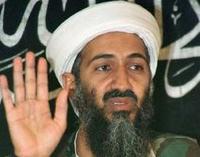
Al Qaeada leaders do not live in a cave; rather, the organization’s top leadership lives in relative comfort, protected by locals and elements in the Pakistani intelligence services, NATO official said; he also offered a grim view of the state of the war: NATO estimates that there are 500,000 to one million “disaffected” men between the ages of 15 and 25 along the Afghan-Pakistan border region; most are Afghan Pashtuns and make up some of the 95 percent of the insurgency who carry out attacks just to earn money, rather than fight for a hard-core Taliban ideology
-
-
Saudis warn France of new terror threats
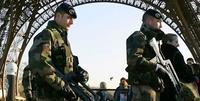
France says that Saudi Arabia has warned French authorities of a terror plot, hatched by al Qaeda elements in the Arabian peninsula, directed specifically at France; France is already on heightened terror alerts following terror threats last month; speculation on the source of those terror threats centered on al Qaeda in the Islamic Maghreb, another al Qaeda offshoot, which took five French citizens hostage in Niger in September
-
-
Chinese hackers steal South Korean defense secrets
Chinese hackers have stolen secrets on South Korea’s defense and foreign affairs by using bogus e-mails claiming to come from Seoul officials and diplomats; similar attacks originating in China-based servers briefly crippled U.S. and South Korean government and commercial Web sites in July 2009
-
-
U.S. fears there are Pakistani Taliban operatives inside U.S.

Senior U.S. officials are concerned over recent intelligence indicating that the Pakistani Taliban, which orchestrated the failed Times Square bombing, may have successfully placed another operative inside the United States to launch a second attack; based on the intelligence, authorities believe the Pakistani Taliban, also known as Tehrik-e Taliban Pakistan, would have directed the individual to attempt another Times Square-style operation, but not necessarily in New York City
-
-
Eighteen Guard members killed in Iran base blast
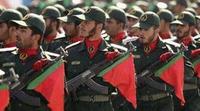
The Iranian Revolutionary Guard was created in 1979 as an ideological bulwark to defend the clerical rule; in time, the Guard has become a vast military-based conglomerate, amassing a network of economic and political power that extends to virtually every aspect of life in Iran; as the West’s covert action against Iran’s nuclear weapons program intensifies, we note more and more “accidents” in Revolutionary Guards bases; in the most recent such accident, 18 Guardsmen were killed and fourteen wounded
-
-
Briton gets 4-months jail for refusing to disclose password
A 19-year old Briton used a 50-charcter password to protect child pornography files he kept in his computers; the court ordered him to reveal the password, but he refused and was sentenced to sixteen weeks imprisonment
-
-
Cole's legacy: a different U.S. Navy
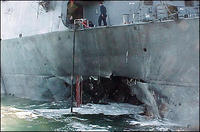
The terrorist bomb attack on the destroyer Cole on 12 October 2000 was a watershed moment in modern Navy history; it was also a wake-up call on the need for better force protection, damage-control training, intelligence sharing, shipboard equipment, and mass-casualty response
-
-
G8 joins fight against al Qaeda in North Africa
Representatives of the G8 meet with African counterparts to formulate strategy to fight al Qaeda’s growing strength on the continent; role of African Union and the Economic Community of West African States among topics discussed
-
-
First responders used runners because radios did not work underground
Emergency services battling to save lives in the wake of the 7 July 2005 London bombings needed to use runners to send messages back to the control room as their radios did not work underground, an inquest into the terrorist attacks has heard
-
-
School settles lawsuits over secret photos for $610,000
A suburban Philadelphia school district, which admitted earlier this year to capturing 56,000 secret Webcam photos and screenshots on school-issued laptops, has agreed to pay $610,000 in settlements; the intimate pictures of students in their bedrooms were taken by Webcam installed on laptops which the school loaned the students
-
-
Captive Briton accidentally killed by rescuers
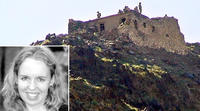
A British aid worker held captive in Afghanistan may have been accidentally killed by a hand grenade tossed by U.S. forces during a daring rescue attempt; it was initially thought that the 26-year old woman died when one of her captive exploded a suicide vest he was wearing, but video evidence now suggest the captive was killed by the forces that came to rescue her; a full U.S./U.K. investigation — which would last several days — was being launched; it will be led by Maj Gen Joseph L Votel, the chief of staff at U.S. Special Operations Command and the results are expected to be made public
-
-
U.S. to spend $7.9 billion on nuclear nonproliferation
A multi-million dollar U.S. program is aiming to make safe the world’s bomb-grade uranium before terrorists can get to it; the U.S. government is so concerned at the threat of nuclear terrorism that next year the budget for making bomb-grade material secure worldwide will be increased by 67 percent to $558 million dollars
-
-
London bombings "planned for 24 hours earlier"
Four Islamic terrorists behind the 7 July 2005 bombings may have intended to commit mass murder twenty-four hours earlier, the inquests into the deaths of their fifty-two innocent victims have heard; the reason for the delay: ringleader Mohammed Sidique Khan visited Dewsbury Hospital with his wife, Hasina Patel, on 5 July because of complications with her pregnancy; she miscarried on the day of the attacks; the hearing was told that the Metropolitan Police investigation database is the largest ever created and thousands of documents have been considered for the inquests
-
More headlines
The long view
Factories First: Winning the Drone War Before It Starts
Wars are won by factories before they are won on the battlefield,Martin C. Feldmann writes, noting that the United States lacks the manufacturing depth for the coming drone age. Rectifying this situation “will take far more than procurement tweaks,” Feldmann writes. “It demands a national-level, wartime-scale industrial mobilization.”
No Nation Is an Island: The Dangers of Modern U.S. Isolationism
The resurgence of isolationist sentiment in American politics is understandable but misguided. While the desire to refocus on domestic renewal is justified, retreating from the world will not bring the security, prosperity, or sovereignty that its proponents promise. On the contrary, it invites instability, diminishes U.S. influence, and erodes the democratic order the U.S. helped forge.
Fragmented by Design: USAID’s Dismantling and the Future of American Foreign Aid
The Trump administration launched an aggressive restructuring of U.S. foreign aid, effectively dismantling the United States Agency for International Development (USAID). The humanitarian and geopolitical fallout of the demise of USAID includes shuttered clinics, destroyed food aid, and China’s growing influence in the global south. This new era of American soft power will determine how, and whether, the U.S. continues to lead in global development.
Water Wars: A Historic Agreement Between Mexico and US Is Ramping Up Border Tension
As climate change drives rising temperatures and changes in rainfall, Mexico and the US are in the middle of a conflict over water, putting an additional strain on their relationship. Partly due to constant droughts, Mexico has struggled to maintain its water deliveries for much of the last 25 years, deliveries to which it is obligated by a 1944 water-sharing agreement between the two countries.
How Disastrous Was the Trump-Putin Meeting?
In Alaska, Trump got played by Putin. Therefore, Steven Pifer writes, the European leaders and Zelensky have to “diplomatically offer suggestions to walk Trump back from a position that he does not appear to understand would be bad for Ukraine, bad for Europe, and bad for American interests. And they have to do so without setting off an explosion that could disrupt U.S.-Ukrainian and U.S.-European relations—all to the delight of Putin and the Kremlin.”
How Male Grievance Fuels Radicalization and Extremist Violence
Social extremism is evolving in reach and form. While traditional racial supremacy ideologies remain, contemporary movements are now often fueled by something more personal and emotionally resonant: male grievance.
